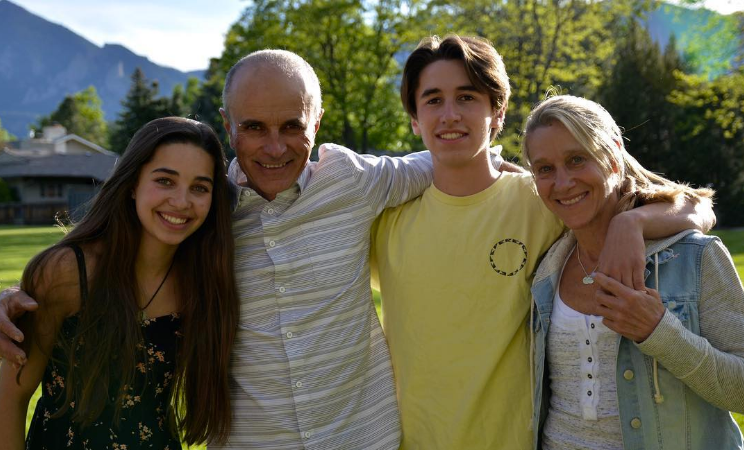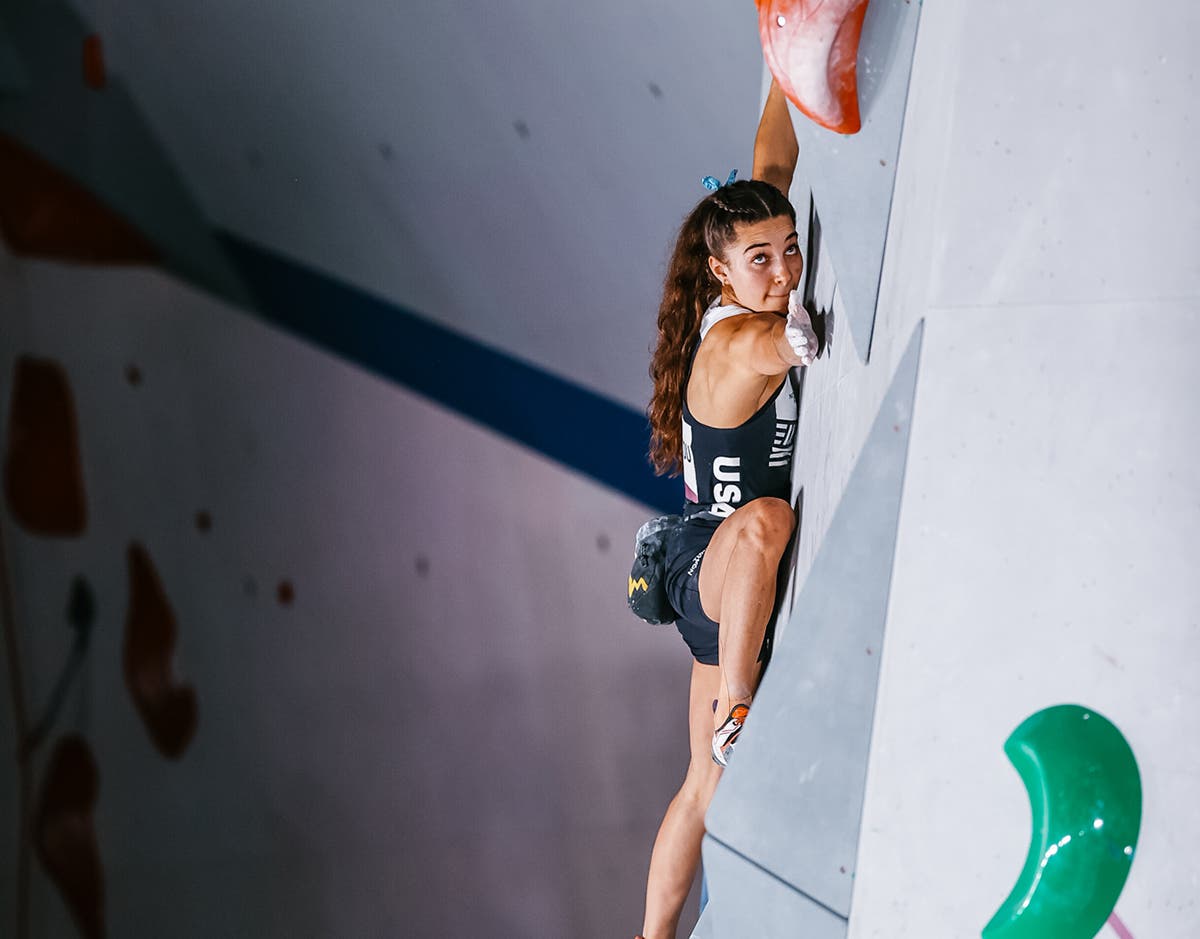"Her mental game was so strong": Robyn Erbesfield Raboutou on watching Brooke in Olympic sport climbing

Brooke Raboutou has generally been a lead specialist, but her breakout moments were in bouldering. (Photo: Ryu Voelkel)
This article is free. Sign up with a Climbing membership, now just $2 a month, and you get unlimited access to thousands of stories and articles by world-class authors on climbing.com and rockandice.com, plus you’ll enjoy a print subscription to Climbing and receive our annual coffee-table edition of Ascent. Outside+ members also receive other valuable benefits including a Gaia GPS Premium membership. Please join the Climbing team today.
Brooke Raboutou returns home from Tokyo today. What do you guess there’s a party at the Denver airport for her and Colin Duffy, both from Colorado’s Front Range, both Olympians, both finalists?
We happened to catch Robyn Erbesfield Raboutou, who is in an extremely unusual position as both mother and coach of an Olympian—Brooke, 20; and Robyn also coaches Colin, 17, who shone as well—this morning for a short interview on her experience as a parent watching her daughter in the Games.

Qualifiers, with 20 women, were August 4, with Brooke making the finals field of eight. All rounds used the combined format, in which scores from speed, bouldering and lead are multiplied, lowest scores win. A win in any round is a great advantage, as a multiplier of 1.
In finals, August 6, Brooke placed fifth overall. It is worth observing that like many “difficulty” climbers, she participated in speed because it was required; without speed, she would have been second, for silver. Paris 2024 will separate speed and difficulty events.
Both of Brooke’s parents, Robyn Erbesfield Raboutou and Didier Raboutou, were climbing champions themselves; in fact, Robyn won the overall World Cup from 1992-95.

In a phone call, Erbesfield Raboutou reviewed the culminating two rounds of the August 6 finals. Those were the difficulty events, Brooke’s spheres of experience.
Brooke shone in bouldering, reaching the tops of the first two problems but, in heart stoppers, not sticking the finishing holds with both hands, which meant she simply got credit for the “zone” hold below. Only reaching the zone hold, placed about halfway up after initial hard moves, and the top are scored.
Asked how it felt to watch, Erbesfield Raboutou answered easily. “In finals I had moments of ‘oh my god’ when she didn’t match on the first two problems and had pressure to get to the zone on the third”—to come through the round in second place, behind Janja Garnbret, the leader and eventual gold medalist.

“Oh, but her mental game was so strong. I was in awe of her climbing … when it all [came] together.” Brooke had of late worked particularly hard on focus and execution. “She’s at another level. That’s the confidence you want to instill in an athlete and of course”—she laughs—“in a daughter.”
On boulder number two in the finals, with time winding down, Brooke reached the big top move, adjusted on the second-to-last holds and sank down to reset. Did she do the right thing, to take that time to set herself up?
“Yes, she did,” Erbesfield Raboutou said quickly. “It was a big move. She had to go down. She calculated. But that cost her some time. That’s life. It was still the right thing to do.” Four minutes per boulder problem is very little time, she observed.
Various watchers, myself among them, found ourselves wishing there was a hold-by-hold scoring system or that there were two zones, to credit anyone who gets higher than the others. Still, Brooke finished the round in second—under stress doing what she needed to on the third problem, reaching the zone.
“Luckily she was able to do it, or she would have lost the momentum,” Erbesfield said. She thinks climbing has reached a level where the system needs to be re-thought.
Leading has been Brooke’s strength, but she showed the world she can boulder. By getting to the last hold on both the first and second bouldering problems, she gave, as Jeff Jackson observed here, “one of the best performances of the entire event—comparable to Schubert’s inspiring send of the lead route and Miroslaw’s world-record sprint.” You can insert your own greatest moments there. For me those would be the 17-year-old Colin Duffy’s first lead, when he looked so solid and composed; Janja Garnet’s first four tops, when we saw the magic in front of our eyes; Adam Ondra’s first master class in lead, first round (tell me we didn’t all just want to see Ondra do what he does); and the moment when Nathaniel Coleman stuck the last move on boulder number 2 in the final, the only man to top it. And: The beautiful rise of Seo Chae-hyun, protégé of the great onetime World Cup leader Jain Kim, in lead qualifiers. Like Duffy, Chae-hyun is 17. And of course Jakob Schubert’s lead flashes, qualies and finals. Some had counted him, a veteran at 30, out. Ha! And Mickael Mawem, winning bouldering qualifiers. Oh, I could go on.
In lead finals, Brooke cruised to the upper wall before a surprise fall. Most of her recent focused progress has been in lead, according to Robyn Erbesfield Raboutou. It was ironic for that to be a disappointment.
“It’s most heartbreaking when you’ve worked really, really hard” for a particular skill, Erbesfield Raboutou said. “She didn’t express herself in lead. That’s just sports.”“You know, I haven’t seen her fall off anything less than 14a in six or nine months,” Erbesfield Raboutou said. “It appears the move had her extended, and she didn’t have her weight on her feet, and next thing you know she was at the end of the rope.“ It seemed clear to those of us watching in the middle of the night here that she could have gone a lot farther.
A broader question, though, is how it all happened along the way. With two parents who are top-caliber athletes, a child may well be born with great physical talents. But where does the emotional or motivational component come in, when the child similarly wants to do a parent’s or the parents’ sport, and at that level of endeavor? Erbesfield Raboutou laughs.
“You get lucky. I don’t think we had anything to do with it.
“We presented [climbing]. We’ll take credit for that. We gave them”—Brooke and Shawn, her brother, also a top-level climber—“the chance to climb and made sure they had friends to climb with, a lot of kids to climb with. We had Team ABC, where they could climb. On top of that, my attitude when it came to taking them along the path was loving and caring, very consciously. That just who I am and Didier is, and both of our kids love to climb.”
Last questions. Any discussion of Paris 2024? “We’re leaving that one alone, for now.”
This past year, in the pandemic, Brooke went outside with her friend Natalia Grossman and climbed up to V14 (including Jade and Two Ton Skeleton in a day) in Rocky Mountain National Park. Was that any sort of factor?
‘Definitely! Always,” the mother, coach and former champion (who still climbs nails hard, up to 5.14 / V12) says. “Because it is for us as a family, and it’s where her passion lies. And there it was a pandemic, and you can’t go to the gym and you can’t see your friends. Thank god for outdoor climbing.”
Brooke herself wrote on Instagram at the time: “I have learned so much the past few months from pushing myself outdoors. I continue to grow as a climber and person every day I spend out there.”